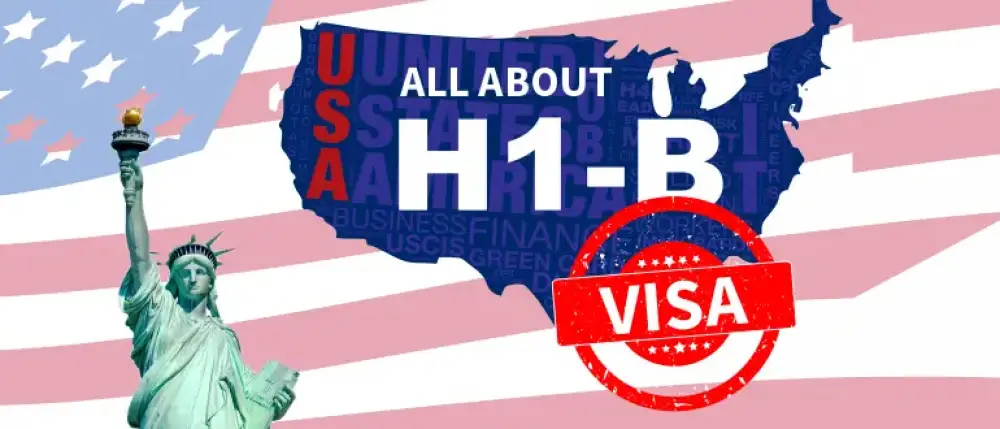
When it comes to the complexities of U.S. immigration, do you know H-1B visa remains the key player? This is a highly sought-after visa because it allows foreign professionals with specialized skills to work in the United States for a temporary period.
Likewise, the challenges associated with H-1B applications are somewhat the toughest. That’s why we, at Dyara, are committed to guiding our clients through the process seamlessly and efficiently which delves into the essentials of H-1B requirements, providing clarity and insights.
What is an H-1B Visa?
The H-1B visa is a non-immigrant visa that allows U.S. companies to employ foreign workers in specialty occupations that require a bachelor’s degree or its equivalent in a specific field.
To qualify for an H-1B visa, employers play a crucial role. They must sponsor the foreign worker and demonstrate compliance with labour conditions, ensuring fair wages and working conditions. Understanding these obligations is essential for both employers and employees.
H-1B Visa 2023 Fact Check:
- Total Number of Applications Received: 483,929
- Number of Petitions Approved: 303,865
- Approval Rate: 63%
- Top Countries of Origin: India (75%), China (10%) & Philippines (4%)
H-1B Visa Requirements

To qualify for an H-1B visa, applicants must meet specific requirements, including:
- Educational Qualifications: H-1B applicants must possess a relevant educational background, typically a bachelor’s degree or higher, directly related to their specialty occupation.
- Job Offer and Employer-Employee Relationship: Applicants must have a valid job offer from a U.S. employer in a specialty occupation that requires the skills and qualifications they possess.
- Cap Limit and Lottery System: The H-1B program operates under an annual cap, leading to a lottery system when applications surpass the available slots. The offered salary must meet the prevailing wage for the specific job title and location.
- Premium Processing : For those seeking expedited processing, the Premium Processing service is an option.
4 Common Reasons For H-1B Visa Denials
The most common reasons for H-1B visa denials include:
- Insufficient Documentation: Missing or incomplete documentation is a major reason for denials.
- Incorrect Job Classification: The job offer may not be classified correctly as a specialty occupation requiring an H-1B visa.
- Non-Compliance with Prevailing Wage Requirements: The offered salary may not meet the prevailing wage for the specific job title and location.
- Issues with Employer: The employer may be misrepresenting or may have a history of visa violations.
How to Increase The Chances Of H-1B Visa Approval?
- Seek Professional Assistance: Consult experienced immigration professionals, like Dyara, who specializes in H-1B visas.
- Gather all Required Documentation: Ensure all documentation is complete, accurate, and organized.
- Preparation: Good preparation and understanding visa requirements is the key to successful obtaining a visa.
- Choose Your Sponsor Carefully: Choose a reputable employer with a proven track record of visa compliance.
Why Choose Dyara?
At Dyara, we are committed to providing our clients with the highest quality of service and support throughout the H-1B visa application process. We have a team of experienced immigration attorneys and specialists who are dedicated to helping you achieve your immigration goals including H-1B visa application assistance, Labour Condition Application (LCA) preparation, prevailing wage determination, visa interview preparation and post-approval support.
H-1B Visa FAQs

There are two main types of H-1B visas:
- Regular cap H-1B visas: These are subject to a cap of 65,000 visas per fiscal year. There is also a separate cap of 20,000 visas for individuals who hold a master’s degree or higher from a U.S. institution.
- H-1B visa exempt employers: Institutions of higher education; Non-profit entities which are “related to” or “affiliated with” institutions of higher education; Non-profit research organizations; Government research organization are exempt from the H-1B visa cap.
- What is the H-1B visa lottery?
Due to the high demand for H-1B visas, an annual lottery is conducted for regular cap H-1B visas. Employers must first register their petitions electronically with USCIS during a designated registration period. USCIS conducts an electronic random selection process of petitions from the pool of registered petitions. Only selected petitions can then be filed with the required fees and supporting documnetation.
2. What are the rights and responsibilities of H-1B visa holders?
H-1B visa holders have the right to work in the United States for their sponsoring employer in the specific specialty occupation listed on their visa. They are also able to enter and exit the United States on their H-1B visa. However, H-1B visa holders cannot change employers without first obtaining a new H-1B visa petition from the new employer. They also cannot work outside of their authorized specialty occupation.
3. What is the H-1B visa application process?
The H-1B visa application process is complex and involves several steps. The employer must first file a Labour Condition Application (LCA) with the Department of Labour (DOL) to demonstrate that there are no qualified U.S. workers available for the position. Once the LCA is approved, the employer can then file a petition with U.S. Citizenship and Immigration Services (USCIS) on behalf of the employee.
4. What is the approval rate for H-1B visas and how long is an H-1B visa valid for?
The approval rate for H-1B visas varies from year to year. In recent years, the approval rate has been around 60%. An H-1B visa is initially valid for three years. It can be extended for up to six years in total.
For any guidance, contact us at info@dyaratech.com.

